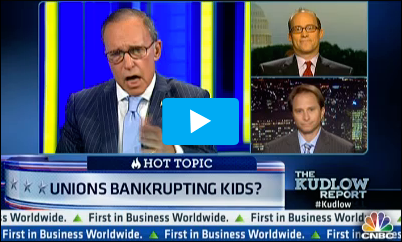I had a reporter ask me this week if I could remember a teachers’ strike as “confusing” as the one in Chicago; it was so hard, she explained, even to know over which issues the teachers were striking.
 Mike broke down the significance of the Chicago teachers' strike on "The Kudlow Report" last night. |
That’s not an accident. The local and national unions surely realized, after an onslaught of negative coverage, that complaining about 16 percent raises on top of $75,000 average salaries was not a winning argument during a period of 8 percent unemployment. So they changed their talking points: Now the teachers were upset about evaluations that would link their performance reviews with students’ test scores. But that position is unpopular, too—and puts the union at odds with President Obama—so now they are striking over…class sizes and air conditioning?
Right.
This is akin to the Republican defense of the dubious “Voter ID” laws: That they are necessary to protect against voter fraud. Everyone knows they are a cynical ploy to suppress the participation of poor and minority citizens—likely Democratic voters. But GOP officials can’t admit that. So they obfuscate.
So it is with the Chicago Teachers Union. It’s the meat-and-potatoes issue of pay and benefits that has been front and center during the months-long negotiations; to argue otherwise is simply dishonest.
And what about the issue of “respect”? The idea that Rahmbo is trying to steamroll the unions on his way to becoming an “imperial" mayor?
This is getting closer to the truth. The unions—in Chicago and other big cities—grew accustomed over the past four decades to holding veto power over all key education decisions. When leaders wanted reform, they needed to accept union-approved, watered-down versions—or pay up. As Rick Hess has argued, the more-money-for-more-reform bargain greased the wheels of compromise during flush times—but is unsustainable during today’s New Normal of flat-lined revenues and gaping deficits.
 Is Rahmbo really trying to steamroll the union? Photo by Yortw. |
To be sure, many teachers (in Chicago and nationwide) feel blamed, discouraged, demoralized, and afraid; those sentiments were on display in the latest MetLife Survey of the American Teacher. The brash rhetoric and take-no-prisoners tactics of reformers—elected and otherwise—surely contribute to this dynamic (along with watching many colleagues get pink slips as districts try to close budget holes).
But such frustrations aren’t why the teachers of the Windy City took to the streets and sent the lives of hundreds of thousands of Chicagoans into disarray. Workers in all sectors of the economy experience stress and slights; it’s part of life. But most don’t walk off the job.
No, this is ultimately about power. The unions are feeling whipsawed by tectonic shifts that have occured within the Democratic Party in recent years, with Democrats for Education Reform creating space for political leaders—from the mayor’s office to the Oval Office—to challenge them on fundamental issues. (And of course there are the charter schools, still open for business, which challenge the union’s monopoly to boot.) As a Chicago teacher told the local news before the strike, “We didn’t start this fight. We’re only defending ourselves.”
She’s right, in a way: For decades there was no fighting, just abdicating, as Democratic city officials gave the unions pretty much everything they wanted. (That’s why there have been so few teacher strikes in the past couple of decades.) Those days are over; the unions aren’t happy about it. Yet even as this week's organized-labor tantrum winds down, it already feels more like a reminder of a past era or a last gasp than a sign of things to come
